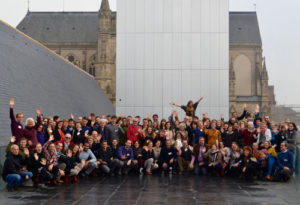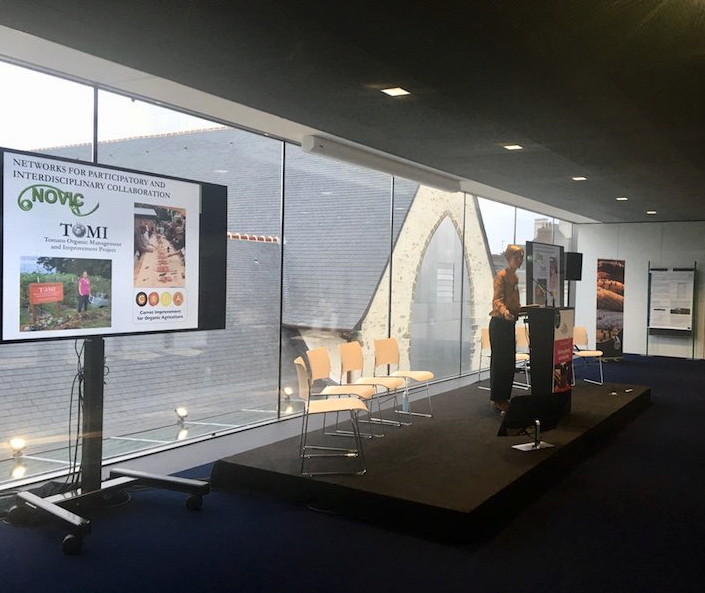
The urgent call to reinvigorate biodiversity and re-empower farmers and eaters in our food system is ringing across the globe. While OSA’s efforts to build resilient, decentralized seed systems focuses on transforming the agricultural landscape in the U.S., our work runs parallel to a growing number of initiatives across Europe and beyond. Last week OSA and other U.S. research partners joined European organizations at the DIVERSIFOOD Congress in Rennes, France, to learn about one another’s work and share results of our research.
The conference chair, Veronique Chable, opened the three-day event with an overview of the DIVERSIFOOD project. The European collaboration aims to enrich cultivated biodiversity by testing, renewing, and promoting underutilized and forgotten crops. Through multi-actor approaches it supports the spread of a new food culture based on diverse, tasty, and healthy food.

Conference participants exchanged experiences and models for diverse seed and breeding projects from community seed networks to new organic breeding methods, and discussed the future priorities to advance the goals of DIVERSIFOOD. Many were heartened to hear about U.S. initiatives including the variety trial and breeding efforts of the Northern Organic Vegetable Improvement Collaborative (NOVIC). They were inspired by the number of farmers engaged in on-farm breeding and the success in expanding commercial availability of participatory-bred varieties.
Julie Dawson, head of the Seed to Kitchen Collaborative (S2K) at the University of Wisconsin-Madison, shared stories and methodology for engaging chefs in variety trials and plant breeding. Dawson recounted the growth and success of variety showcases hosted by S2K and the Culinary Breeding Network, led by Lane Selman. NOVIC corn breeder Bill Tracy, also from UW-Madison, shared work of OSA researcher Jared Zystro to breed new corn varieties adapted to organic conditions by leveraging genomic information with organic field testing. OSA’s Cathleen McCluskey provided perspective on the importance of farmer’s knowledge and ability to manage on-farm genetic diversity by sharing outcomes of interviews with corn growers across the Midwest.
The conference closed with keynote talks from OSA’s Micaela Colley and Michigan State University’s Phil Howard. Colley provided an overview of U.S.-based efforts to develop decentralized, organic, and biodiverse seed systems. Howard presented the sobering state of ever increasing consolidated corporate control of our food system. His talk drove home the importance of building decentralized models of seed stewardship to counter impacts of consolidation.
After two days of workshops, participants had the opportunity to tour grain and vegetable farms in the Brittany region. One of the tour locations highlighted a network of 7 vegetable farmers who are collaborating to bring heritage cabbage varieties out of the seed bank and back into cultivation. Their work includes coordinated trials, seed saving, and on-farm breeding. Tour participants also had the chance to see cabbages in the field that looked like they’d been taken from the pages of history books – with deeply contrasting veining patterns, savoyed textures, and diverse shapes.
Participants left the event with a commitment to work together to shift from the dominant paradigm of concentrated control to one that honors diversity and celebrates seed as a living entity. OSA is proud to join the call to action to protect and expand biodiversity at home and in solidarity with efforts around the globe.
